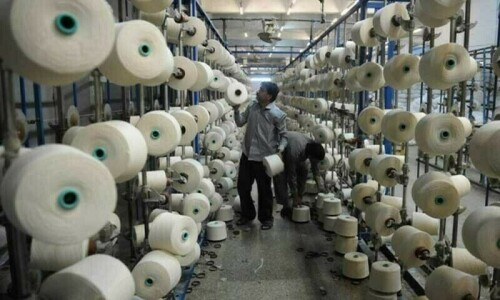Indian Prime Minister Narendra Modi in a meeting with fellow BRICS leaders on Sunday in Goa urged them to take a strong united stand against the "mothership of terrorism" in the South Asian region, in a thinly veiled reference to Pakistan.
Modi said a country in India's neighbourhood held links to "terror modules" around the world, which BRICS ─ a bloc consisting of Brazil, Russia, India, China and South Africa ─ should strongly condemn.
"In our region, terrorism poses a grave threat to peace, security and development."
"Tragically the mothership of terrorism is a country in India's neighbourhood," Modi said without naming Pakistan.
"Terror modules around the world are linked to this mothership. This country shelters not just terrorists. It nurtures a mindset. A mindset that loudly proclaims that terrorism is justified for political gains."
"It is a mindset we strongly condemn. And against which we as BRICS need to stand and act together. BRICS must speak in one voice against this threat," he said.
Modi has been using the BRICS summit an an attempt to isolate Pakistan following a surge in tensions between the two countries.
Analysts are sceptical of India's chances of securing a joint BRICS condemnation given China's strong diplomatic support for Pakistan and Russia's efforts to forge closer defence ties with Islamabad.
Modi in his closing remarks at the end of the two-day summit told reporters that BRICS leaders had been unanimous in recognising the threat posed by terrorism to economies globally.
The sponsors of terrorism were "as much a threat to us as the terrorists themselves", Modi said.
In their joint statement later Sunday, the BRICS leaders condemned recent attacks against some of its members "including that in India" but made no mention of Pakistan.
"We strongly condemn terrorism in all its forms and manifestations and stressed that there can be no justification whatsoever for any acts of terrorism, whether based upon ideological, religious, political, racial, ethnic or any other reasons," the statement said.
The Indian prime minister stepped up a drive to isolate Pakistan diplomatically after the Uri army base attack.
Hours after the attack occurred, Indian Home Minister Rajnath Singh termed Pakistan a 'terrorist state'. India also accused Pakistan of involvement in the attack.
Read more: Two guides from Muzaffarabad facilitated Uri attackers, India tells Pakistan
The Uri attack occurred days before Prime Minister Nawaz Sharif was set to address the United Nations General Assembly regarding Indian human rights violations in held Kashmir.
Following the attack, India claimed to have conducted a cross-border 'surgical strike' against 'launch pads of terror' in Azad Jammu and Kashmir ─ a claim Pakistan has strongly rejected.
Pakistan maintains India is attempting to divert the world's attention away from 'atrocities' committed by government forces in India-held Kashmir.
Pakistan and India have locked horns over the Kashmir issue since Indian forces stepped up a crackdown against protesters after Hizbul Mujahideen commander Burhan Wani was killed by government forces in July.
Over 80 people have been killed and hundreds of protesters injured in clashes with Indian security forces.
Global economy in precarious state, Xi tells BRICS summit
Chinese President Xi Jinping warned that the global economy remained in precarious condition as leaders of the BRICS group of nations tried to find ways to fire up growth in the troubled bloc.
Speaking at a summit in Goa, Xi told his host Modi and other BRICS leaders that the club of emerging powers had been undermined by both domestic and international woes.
But the leader of the world's second largest economy said the long-term forecast for BRICS members was positive as he called for more confidence-building measures.
"The global economy is still going through a treacherous recovery," Xi said in a statement at the summit.
"Because of the impact of both internal and external factors, BRICS countries have somewhat slowed down in economic growth and have faced a number of new challenges in development."
BRICS was formed in 2011 with the aim of using members'growing economic and political influence to challenge Western hegemony.
The nations, with a joint estimated GDP of $16 trillion, set up their own bank in parallel to the Washington-based International Monetary Fund and World Bank and hold summits rivalling the G7 forum.
But the countries, accounting for 53 per cent of world population, have been hit by falling global demand and lower commodity prices, while several have also been mired in corruption scandals.
Russia and Brazil have fallen into recession recently, South Africa only just managed to avoid the same fate last month and China's economy has slowed sharply.
India by contrast is now the world's fastest-growing major economy in an otherwise gloomy environment.
Modi said it was vital that the BRICS nations found ways of increasing their levels of cooperation. He called for the dismantling of trade barriers, promotion of skills and infrastructure development.
"Promoting economic and commercial engagement has been a foundational impulse in creation of BRICS," he said.
Modi, who came to power two years ago, said his government's policy of opening up the Indian economy had achieved results and offered valuable lessons.
"In India, we have undertaken substantial reforms in the last two years to streamline and simplify governance, especially doing business in India," said the Indian prime minister.
"The results are clearly visible. We have moved up in almost all global indices that measure such performances.
"We have transformed India into one of the most open economies in the world today."
Xi said there was no reason why the bloc's members should not flourish as he called on a group made of business leaders from BRICS nations "to take concrete actions to boost confidence".
"The potential and strength of BRICS countries in terms of resources, market and labour forces have remained unchanged," he said.
"The long term... of BRICS development is still positive."
















































